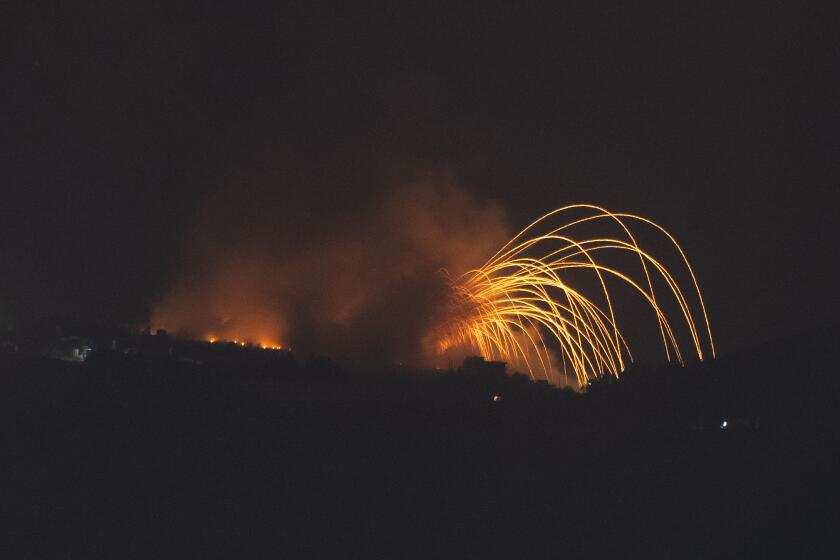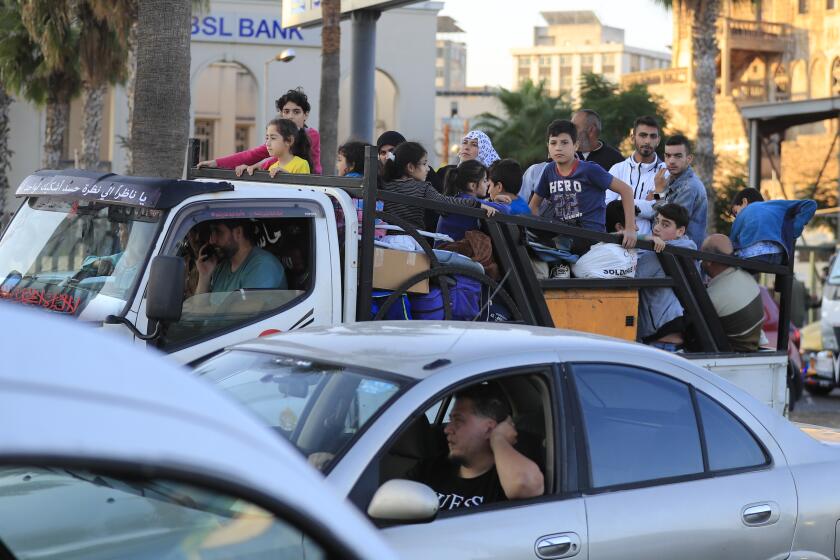Israel and Iran exchange threats as combat surges in southern Lebanon

- Share via
- Hezbollah reports clashing with Israeli troops just on the Lebanese side of the border.
- In Israel, Prime Minister Benjamin Netanyahu said Iran “made a big mistake” with Tuesday’s missile attack on his country and “will pay for it.”
- “We strongly warn against Iran, or its proxies, taking actions against the United States, or further actions against Israel,” said Linda Thomas-Greenfield, the U.S. ambassador to the U.N.
BEIRUT — As war in the Middle East widens, Iran and Israel on Wednesday traded threats of destruction following the Islamic Republic’s missile barrage against Israel, while the Lebanese militant group Hezbollah and Israel reported the first “close-quarter” combat between their forces in southern Lebanon.
Hezbollah reported clashing with Israeli troops just over the Lebanese side of the border near the villages of Odaisseh and Maroun Al-Ras, saying its fighters “repulsed” an infantry unit after “inflicting losses.”
The Israeli military confirmed the fighting and announced the deaths of eight officers and soldiers. Israel released video of its tanks rolling into the neighboring country, the first Israeli invasion of Lebanon in 18 years. Smaller incursions by Israeli special forces have been taking place fairly regularly over the last year, Israel said.
“We have ground operations in close proximity to the border and extensive operations against their [Hezbollah’s] leadership and the strategic capabilities they have,” Israeli military spokesman Lt. Col. Peter Lerner said Wednesday in a briefing in Tel Aviv.
Mohammad Afif, spokesman for Hezbollah, whose leadership has been pulverized in days of Israeli airstrikes, said the Iranian-backed group was prepared to mount a fierce resistance to the invasion despite its losses. Hundreds of civilians have also been killed in the strikes, Lebanese officials said.
Israel began a ground invasion of southern Lebanon, vowing a limited operation targeting Hezbollah militants. Iran responded with a missile strike.
“War is rounds. And if you have gotten us in the first round through assassinations and destruction, we are only in the first round,” Afif said. “Our forces are at the utmost readiness for confrontation, heroism and sacrifice.”
Last year, Hezbollah started sending rockets and drones over northern Israel the day after the Hamas militant group that ruled in Gaza invaded southern Israel on Oct. 7. That attack, which killed about 1,200 people and saw about 240 hostages seized, spurred Israel’s war in Gaza. Hezbollah vowed to continue attacks until there is a Gaza cease-fire.
On Tuesday night, Hezbollah patron Iran launched about 180 ballistic missiles at Israel, only its second-ever direct attack on the nation. One Palestinian man was killed and a handful of Israelis injured, while no major damage was reported, officials said. U.S. and British air forces joined the Israelis in intercepting most of the missiles. The U.S. described the attack as a major escalation but “ineffective.”
The conflict between U.S.-backed Israel and Iran-backed Hezbollah could reach unprecedented levels of danger and destruction if it becomes all-out war.
Israeli Prime Minister Benjamin Netanyahu said Iran “made a big mistake” by attacking and “will pay for it.”
Lerner, the army spokesman, praised air defense by Israel and the U.S. that he said prevented major damage. “Within an hour of the attack, [which sent millions of Israelis into bomb shelters], life went back to normal and Israel is back on forward footing,” he said, noting senior Israeli leaders are in urgent meetings to discus next steps. “One ballistic missile is an unacceptable reality for any sovereign state; 180 means there will be consequences.”
President Biden said he “fully, fully” supported Israel’s right to its “defense.” Asked Wednesday if he would support an Israeli strike on components of Iran’s nuclear program, Biden told reporters, “The answer is no.”
“We will be discussing with the Israelis what they are going to do,” he added. Biden was speaking after a joint telephone meeting with leaders of the Group of 7, the world’s largest democracies. They “unequivocally condemned” Iran’s missile attack on Israel, the White House said, expressing solidarity with Israel while also urging restraint.
U.S. officials say they recognize that Israel will feel obliged to retaliate, but are hoping its actions are not of a scale that will in turn prompt Iran to again attack. Hitting Iran’s nuclear program would be especially provocative, analysts said, more so than bombing its oil or gas industries.
Netanyahu has largely ignored previous U.S. calls for restraint.
Hezbollah appears outmaneuvered by a technologically superior foe that has assassinated much of its top leadership and destroyed a significant portion of its weapons.
The U.S. ambassador to the United Nations on Wednesday encouraged the U.N. Security Council to condemn Iran’s attack on Israel and issued a warning to the Islamic Republic, blaming its funding of militant groups for worsening crises in Lebanon and the Gaza Strip.
“We strongly warn against Iran, or its proxies, taking actions against the United States, or further actions against Israel,” Linda Thomas-Greenfield said.
Iran’s foreign minister, Abbas Araghchi, said his country will launch a “harsher” attack against Israel if it retaliates for Tuesday’s bombardment, and warned “any third party” and especially the United States to stay out of the conflict.
“We will confront and answer any third party that enters any operation against us in support of the Zionist regime, and we will have a crushing response,” he said on Iranian TV.
Israel, meanwhile, on Wednesday declared U.N. Secretary-General António Guterres persona non grata and barred him from entering the country, saying he had not condemned Iran’s missile attack forcefully enough.
Guterres said later at an emergency session of the Security Council, “As I did in relation to the Iranian attack in April — and as should have been obvious yesterday in the context of the condemnation I expressed — I again strongly condemn yesterday’s massive missile attack by Iran on Israel.” He called for an immediate cease-fire in Gaza and an end to the hostilities in Lebanon.
Also Wednesday, Afif, the Hezbollah spokesman, took journalists on a tour of Dahieh, the Hezbollah-dominated southern suburb of Beirut that has been pounded in recent days by Israeli air assaults. Israel says it is targeting Hezbollah positions, weapons caches and infrastructure across the country, including in Dahieh. To do so, it has used bunker-buster missiles and heavy ordnance that has obliterated residential compounds and buildings.
Lebanese families flee their homes and mourn their lost relatives as the conflict between Israel and Hezbollah heats up.
Standing before the ruins of what was the broadcast station for a religious channel, Afif sought to counter the contention that many of the residential buildings were being used to store weapons. Israel was destroying “for the sake of destruction itself,” he said.
Dahieh, a densely populated area — before Israel’s escalation, it had more than 700,000 people — with shops, restaurants and residential towers, has been all but emptied in the last week, after a massive Israeli strike killed Hezbollah head Hassan Nasrallah and other leaders. The full death toll from that strike has yet to be determined because of the extent of the rubble and the danger of subsequent Israeli bombardment.
Normally traffic-choked streets in the area are abandoned, save for a few vehicles whose drivers race to their homes to pack whatever they can before driving away again. On their way, some go by the site of the latest strike to snap pictures of the damage, but they only stop for a moment.
Bulos reported from Beirut and Wilkinson from Washington.
More to Read
Sign up for Essential California
The most important California stories and recommendations in your inbox every morning.
You may occasionally receive promotional content from the Los Angeles Times.
















